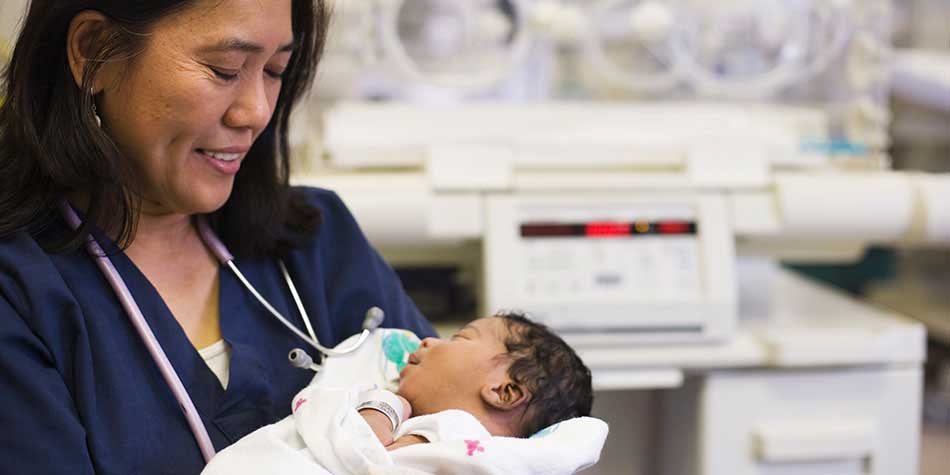
Location. Location. Location.
Where you deliver is a key factor in how your delivery experience will go. Before you decide, you’ll want to discuss your options with your doctor or midwife, and your pediatrician, if you have one already; then plan a visit. A labor and delivery tour allows you to see and hear things for yourself, get familiar with the hospital's layout, and get answers to put you at ease.
Tour guides prepare their talk to cover lots of ground, but asking questions is always encouraged. We’ve compiled the essential ones to get you started. Don’t be afraid to mention any concerns or fears. A good tour can help you feel prepared and comfortable for the big day!
1) What will my insurance cover?
Make sure you understand the costs and services provided, including options, like a private room vs. a shared room. Knowing what your insurance covers can help you decide where to deliver and how to budget for your portion of expenses. Many birthing centers will estimate your costs when you preregister.
2) Do I need to preregister?
Once you decide where you’d like to deliver, preregister to save time and hassle when you’re in labor. Digging for your insurance card between contractions is no fun.
3) What should I do before I come in for my delivery?
Many hospitals offer maternity nurse navigators to help expectant parents learn about their options for the birth of their baby. From education about your pregnancy to scheduling tests and information about birth certificates and name changes, they are your go-to before, during, and even after your baby (or babies!) is born.
4) What should I pack?
Many hospitals will provide a list of things to bring from home, like clothes for mom and baby, a pillow, and music. Get the list and pack a “go bag” early! It’s important to ask if certain things are prohibited, so there aren’t any unhappy surprises when you arrive.
5) Will you follow the birth plan I made with my doctor?
A birth plan is a wish list, not a guarantee. Most birthing centers encourage creating a plan, but caution that you may not be able to follow it to the letter. For example, if your labor does not progress as expected, you and your birth team might decide that certain interventions are appropriate. If it’s important to you, ask about it.
6) Do I need to stay in bed or on a monitor the whole time?
Can I labor in a tub or shower? Can I eat and drink during labor? Policies vary so understanding them in advance can help you plan. Many labor and delivery centers have updated policies to reflect newer thinking and research.
7) Who can be in the room when I deliver?
Are cameras or video cameras allowed? Hospital policy may limit the number of people who can be in the room at the time of delivery for safety. You may also have a special request for friends or family members to be with you – or to stay in the waiting room. Ditto camera and video equipment – it’s usually your choice, but you should ask.
8) What are my options for pain management?
What if I change my mind? This is a valid question that needs to be discussed with your doctor or midwife as well. Typically, birthing centers offer a variety of pain management options but some centers may limit those to natural techniques.
9) What happens in case of an emergency?
Even if your pregnancy has been problem-free and routine, it’s important to understand what options are available if a medical emergency does arise – for you or your baby – including if or when it may be necessary to be transferred to another facility.
10) What birthing amenities do you provide?
Birthing centers now offer many birth aids, from bathtubs to birthing balls, essential oils to music therapy. Doulas and other labor assistants are options that may be helpful to you, in addition to a doctor’s care. Ask about all that is available to you so you can add items to your birth plan and enjoy the benefits.
11) What kind of education and classes do you provide?
Sibling classes, new parent classes, and other pre- and post-natal classes can help you and your family adjust to a new baby with ease. Many hospitals also offer lactation assistance while you and your baby are there. These types of services can also be money savers – sparing you from having to hire outside help.
12) What are your security policies?
Security policies exist to provide peace of mind to hospital staff and their patients. These questions will help you avoid no-no’s like walking in the halls with your baby in your arms, which is often prohibited because of the risk of fainting or falling.
13) What are visiting hours and who can visit?
Perhaps you want your support person to stay overnight with you, or your family and other children to visit, or perhaps you want to be left alone to bond. Many birthing centers with private rooms now offer 24/7 visitation, provided it’s what you want and visitors are healthy and respectful of others.
14) What other features do you offer?
From celebratory meals to photographers, different hospitals offer additional amenities that might help you in planning your stay. Ask about them early to avoid duplicating your efforts.
15) How long is the average stay?
You’ll need to recover and complete medical exams for mom and baby. Understanding the average amount of time you'll be there helps you plan for bringing baby home.
Check out our 40 Weeks Alexa skill. You can also find a doctor, explore our maternity center, and register for classes.
$webqFacilityNumber
Need a Physician?